February 20, 2023
5 Tips on Healing with an Eating Disorder
Written by Sara Lane
Posted in Emotional Eating & Body Image and with tags: disordered eating, eating disorders

Wondering how to heal from an eating disorder? Learn more about the types of eating disorders and how you can begin to heal.
An eating disorder is classified as a behavioral condition that is characterized by severe and persistent disturbance in eating behaviors and associated distressing thoughts and emotions.
These can be very serious conditions that affect physical, psychological, and social functioning. Eating disorders include extreme emotions, attitudes, and behaviors surrounding weight and food issues.
Eating disorders are serious emotional and physical problems that can have life-threatening consequences.
Types of eating disorders include:
- Anorexia nervosa
- Bulimia nervosa
- Binge eating disorder
- Compulsive exercise
- Avoidant restrictive food intake disorder (ARFID)
- Other specified feeding and eating disorder
- Pica (consuming items not classified as food)
- Rumination disorder
A Detailed Look at Eating Disorders
An eating disorder can take on many forms. Eating behaviors might include binge eating, restricting food, or compensating for calories eaten by purging or compulsive exercise.
**Eating disorders can be life threatening.
An eating disorder does not look a certain way.
The following is a breakdown of the most common and well-known eating disorders:
1. Anorexia nervosa
Anorexia nervosa is an eating disorder characterized by low body weight and an intense fear of gaining weight.
People with anorexia generally restrict the number of calories and the types of food they eat. Some people with the disorder also exercise compulsively, purge via vomiting and laxatives, and/or binge eat.
Anorexia can affect people of all ages, genders, sexual orientations, races, and ethnicities.
Anorexia has one of the highest mortality rates of all mental health conditions.
If you suspect that you or someone you love may be struggling with anorexia, getting help can significantly increase your chances for a healthy life.
2. Bulimia nervosa
Bulimia nervosa is an eating disorder characterized by a cycle of bingeing and compensatory behaviors such as self-induced vomiting designed to undo or compensate for the effects of binge eating.
Bulimia can have a serious impact on multiple aspects of health as well, including:
- tooth decay
- weakened heart or heart failure
- dehydration, electrolyte imbalance
- irregular heartbeat
- mood disorders
- esophogeal tears or rupture
- intestinal damage
- kidney damage
- low blood pressure
- fertility and reproductive issues
3. Binge eating disorder (BED)
Binge eating disorder (BED) is a severe, and treatable eating disorder characterized by:
- recurrent episodes of eating large quantities of food (often very quickly),
- a feeling of a loss of control during the binge,
- experiencing shame, distress or guilt afterwards, and
- irregularly using unhealthy compensatory measures (such as purging) to counter the binge eating.
It is the most common eating disorder in the United States.
Eating disorders are biopsychosocial illnesses caused by both genetics and the environment.
Eating disorder researchers have said, “Genetics loads the gun, and the environment pulls the trigger.”
These conditions can be extremely difficult to confront and treat as they are complex, but there are ways to heal from an eating disorder.
Given the complexity of confronting, treating, and maintaining your recovery from an eating disorder, consider these four tips on healing an eating disorder:
1. Collaborate with a Mental Health Professional
The world is bursting at the seams with information and guidance on every possible topic. The only problem is that some of that information is great, but a lot of it is just as – or even more harmful than – the original disorder itself.
Self-help books and blogs aren’t guaranteed to be helpful.
More and more people are:
- focusing on mental health,
- reaching out for help from mental health professionals, and
- recognizing that it is okay and even beneficial to reach out for professional help.
Here is a great resource to start with:
The process of picking a practitioner might not be linear. Your first chosen mental health professional might not be a good fit. That’s fine.
You can move on down the list and try another professional. It’s kind of like that saying, “If at first you don’t succeed, try, try again.”
Once you find someone you feel you can trust, that person will likely be able to offer recommended resources, ie. books, websites, YouTube accounts, podcasts, blogs, and support groups or resources for additional support in between sessions.
If you are looking to specifically focus on healing from an eating disorder, look for practitioners that focus on eating disorder recovery.
Counselors and/or psychiatrists that focus primarily on eating disorder recovery are more aware of strategies and can work with you individually to create a strategy to overcome an eating disorder at its roots.
Your therapist will also collaborate with a dietitian specializing in eating disorder care to help your body begin healing physically as well.
At Eddins Counseling Group, our Client Care Coordinators will match you with a good-fit therapist in one of our Houston, Montrose, or Sugar Land locations.
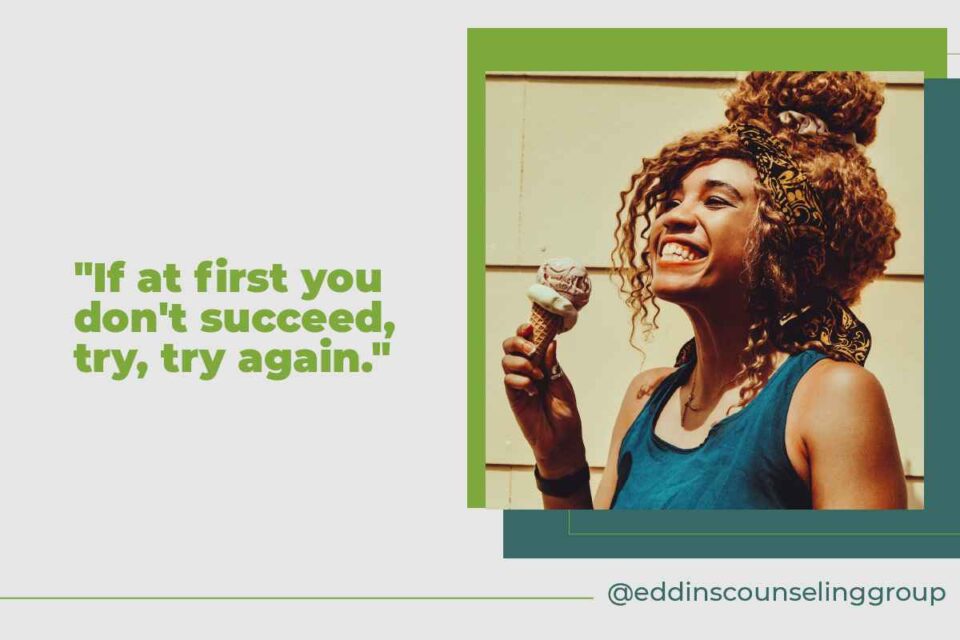
2. Consider All Treatment Options
Sometimes it makes sense to begin eating disorder recovery with a more intensive focus. Perhaps your symptoms have been persistent for quite some time, or you may need more support initially to get unstuck from eating disorder behaviors that may be taking a significant toll on your physical and emotional health.
A therapist can also discuss your treatment options with you, especially if you are just beginning the recovery process.
Contact a treatment facility that specializes in eating disorders and features various levels of treatment (Intensive Outpatient, Partial Hospitalization, Residential).
The intake staff will speak with you over the phone to assess your level of disordered eating – it’s important to be as honest as possible so the right type of treatment for your unique situation can be assessed. You may benefit from medical treatment and stabilization prior to beginning therapeutic treatment.
After asking a series of questions, the intake staff will be able to suggest whether inpatient or outpatient care would be most appropriate according to your symptoms.
Your health should be number one priority.
If no such institution is available within proximity, it’s best to seek out an outpatient therapist or dietitian with expertise in eating disorders who can help you create a program tailored to your needs.
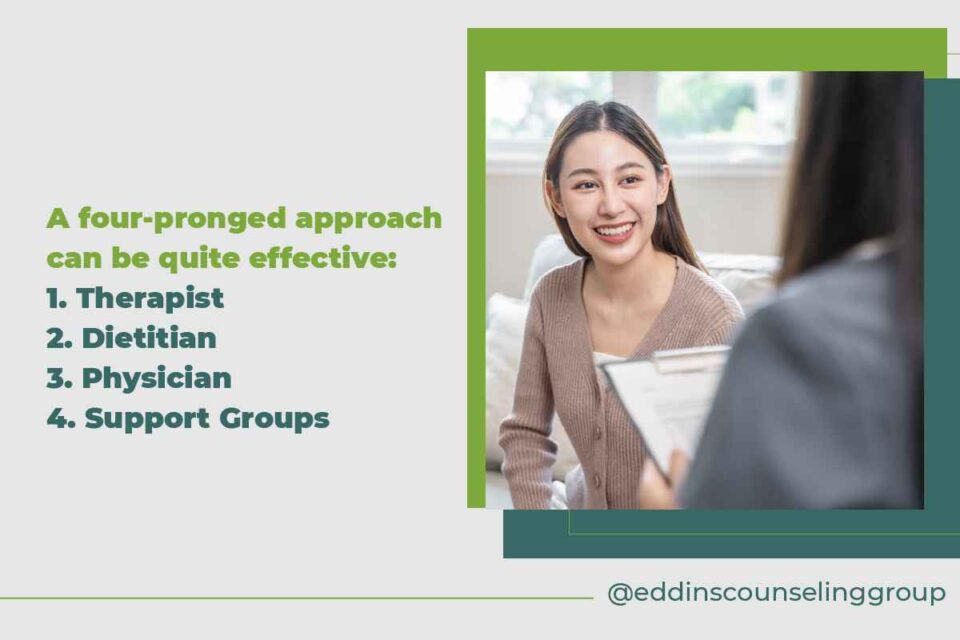
A four-pronged approach generally produces the highest percentage of success rate for eating disorder recovery.
This approach consists of a:
2.1) Therapist
A therapist is a key partner in helping you recover from an eating disorder and create a life worth living. Eating disorder therapy involves more than just shifting out of unhealthy eating behaviors and body image. Rather, therapy helps you develop skills to cope with difficult emotions, improve your relationship with yourself and others, and develop a loving relationship with yourself and your body. You’ll learn skills to cope with negative, unhelpful thoughts, recognize your emotions and what needs they are communicating, and clarify your values and the things that bring you joy.
2.2) Dietitian
A dietitian specializing in eating disorders is a key partner in your recovery process. Dietitians will help with specific eating disorder behaviors. And importantly, will help ensure your body receives the right balance of nutrients to heal nutritional deficits.
When your body is lacking in certain macronutrients, it can significantly impact your body’s ability to support optimal functioning, and even more so, its ability to heal. Nutritional therapy is designed to support your mental and physical needs as well as the absorption of vitamins, minerals, and medications your body needs to function properly.
Dietitians will work with your individual preferences to help explore your relationship with food. They will also make recommendations to restore nutritional balance, which can help prevent cravings and crashes throughout the day.
The “Healthy at Any Size” philosophy focuses on helping your body to find health from the inside out.
HAS focuses on the root issue of the disorder, (such as personal perception of one’s relationship to their body image), not your weight.
2.3) Physician
Physicians work in congruence with the dietitian and therapist to restore physical health while they focus on supporting their mental and nutritional health.
Making a quick change to one’s diet can be very harmful to the body, so it is important for your therapist, dietitian, and physician to be on the same page regarding the treatment plan so that the recovery is safe.
A medical doctor will likely monitor labwork and other physical health indicators.
2.4) Support Groups
Surrounding yourself with other individuals that understand the struggle of eating disorders can be very valuable for healing.
Being able to understand other perspectives and navigate different coping strategies can be very beneficial, not just for you, but for others attempting to seek solace.
Eddins Counseling Group offers group programs that offer additional opportunities for growth and support for people who struggle with food issues:
- Eating Disorder Therapy Group is for those working on recovery from eating disorder symptoms.
- Make Peace with Food Group is for those working to overcome chronic dieting, emotional overeating, compulsive eating or binge eating.
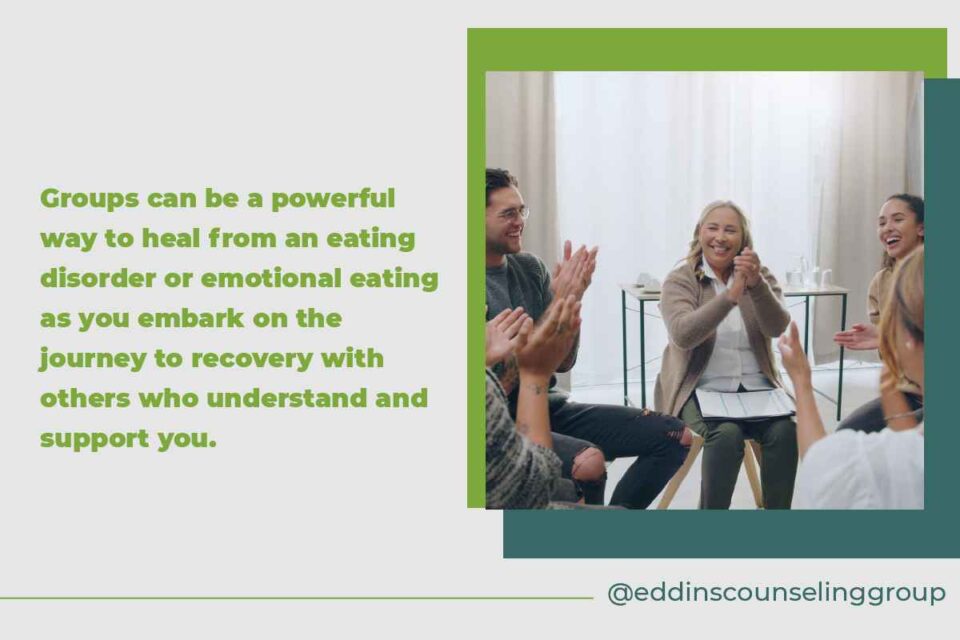
3. Focus on Self-Love, Self-Worth, and Connection
A strong sense of self-loathing and being overly critical of yourself is not uncommon in people dealing with an eating disorder.
Combat these negative viewpoints of your self-image by learning self-compassion. Or consider other methods of self-love like choosing to focus on the qualities of yourself you love most.
Try these strategies for accepting yourself.
Utilizing the coping strategies that have been provided by both professionals and those that have also been through the struggles of an eating disorder can prove pivotal to the healing process.
Recognizing and subsequently challenging negative self-talk can help to shift the negative eating disorder voice.
While taking care of your mental health, it is also important to take care of your physical health.
If you are noticing that your healing process is bringing up physical symptoms, it is important to consult your physician and let them know exactly what is going on so that they can assist you.
Fill downtime with positive and fulfilling activities.
It is important to occupy your time with activities, especially with others, so that you are decreasing isolation, loneliness, and shame and increasing your connection to things outside yourself. Instead of scrolling through social media, consider going out to the park with friends or visiting local spots you have always wanted to explore!
If you are looking for a romantic partner, it is important to find an individual who will understand your struggles and triggers, while also being supportive on your healing journey.
If you are currently in a relationship, bring your partner to a therapy session with you to discuss ways your partner, loved one, or family member can support you in your healing process.
If a potential romantic interest makes comments about your body that you are uncomfortable with, set an appropriate boundary. It’s not ok for others to make comments about YOUR body! This is a boundary violation.
Keep your friends and loved ones invested in your journey.
They are wanting to support you in any way they can, and can only be as invested as you allow them to be.
It can be intimidating, and even scary, to allow others into your struggles, but if you allow others to be supportive, you will find it easier to share your exact feelings.
Eating disorders thrive in isolation, secrecy, and shame. It may feel very scary, but sharing with loved ones what you are going through can be an immense source of relief and support.
4. Learn Your Triggers
Our culture embraces the thin ideal. This is an environmental trigger that contributes to the development of an eating disorder.
It is important to protect yourself from the “thin ideal” and other potential negative behaviors, influences, and triggers that contribute to eating disorders.
Some examples of triggers can include:
- Negative comments from others:
Pointing out body weight or areas of vulnerability, comparing one’s body to another’s, and associating beauty with importance (both in success and romance).- If you’re a member of a sorority that demands every sister be 130 pounds or less, and your natural weight is 135, it’s time to disaffiliate.
- If a romantic partner tells you that you need to maintain your weight to make them happy, it is time to break things off.
- Scrolling Instagram and being bombarded with airbrushed photos of women and men.
- Remind yourself that Instagram does not always equal reality.
- Consider unfollowing accounts that make you feel less confident about your body.
- Consider following accounts that can help build positive reinforcement.
- Seeing scales or mirrors around your house can be too much for some. Some may even be triggered by walking past a mirror, especially if it is full length. Consider ditching your scale. If that feels too much, then at a minimum, avoid weighing yourself. When visiting a medical professional’s office, ask to be weighed backward or ask for the number on the scale to be kept private so you are not triggered.
- Clothes shopping. Trying on clothes that do not fit and then feeling like you have to lose weight to fit the clothes can be triggering. Having to switch to a larger size can also be triggering. Wear clothes that make you feel good and reflect your personal style vs hiding who you are.
- Certain restaurants or bars might trigger your disorder. This can especially be true if one had a very negative experience that directly correlated to how they feel about their weight.
- The time of the year. Specific “stressful” times of the year can include:
- Bathing suit season
- Summer
- Large gatherings (especially if others are wearing little amounts of clothing)
- Upcoming performative assessments (exams, big meetings, major consequence-related events)
- First dates (especially with people who do not understand what eating disorders truly are and encapsulate)
Simply recognizing an imminent trigger can help you shut it down, bypass it, or cope with it in a healthy way.
Understanding what personal triggers you have is important so that when you are confronted with them, you can navigate them in a way that is healthy.

5. Find Ways to Maintain Lasting Recovery
Healing from eating disorders is possible. Maintaining your recovery might be more difficult. You might feel fine one day and then feel like you fell down the rabbit hole the next.
But remember, recovery can happen no matter how long you struggled with an eating disorder.
There are five Stages of Change that occur in the recovery process:
- Pre-Contemplation,
- Contemplation,
- Preparation,
- Action, and
- Maintenance
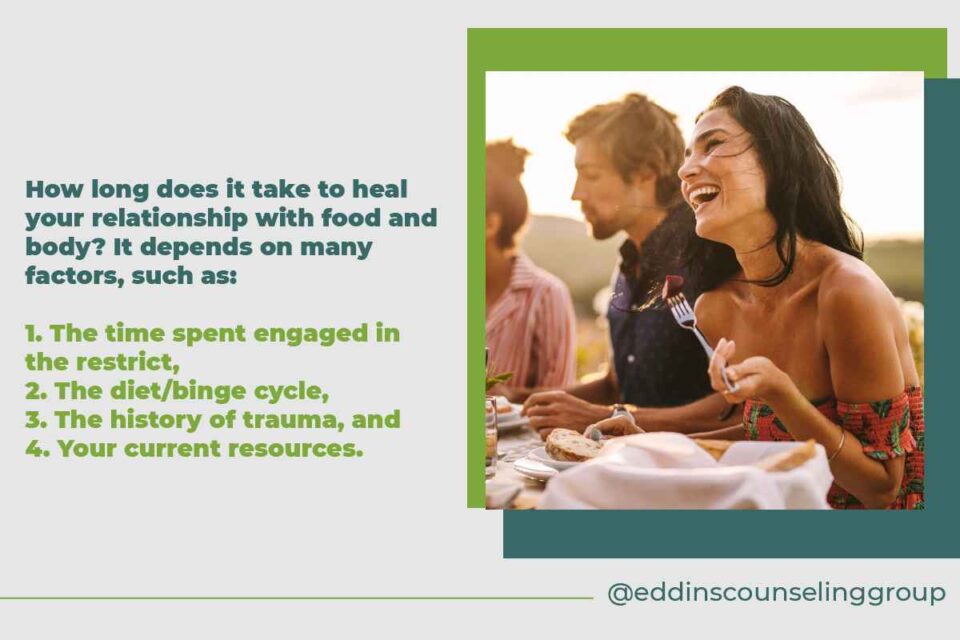
The maintenance stage might look like this:
- Actively practice new behaviors and new ways of thinking,
- Consistently use both healthy self-care and coping skills,
- Revisit potential triggers in order to prevent relapse,
- Establish new areas of interests, and
- Begin to live their life in a meaningful way.
Source: nationaleatingdisorders.org/stages-recovery
To prevent relapse, it’s beneficial to ask the following questions:
- Have I mastered the Stages of Change in the major areas of my eating disorder?
- Do I have the coping skills necessary to maintain these changes?
- Do I have a relapse prevention plan in place?
- Am I willing to resume treatment in the future if necessary?
To prevent relapsing do not forget to ask for help, communicate your thoughts and feelings, address and resolve problems as they arise, live a healthful and balanced life, and remember that you would not have made it this far if it were not for your strong determination and dedication toward recovery.
Source: nationaleatingdisorders.org/stages-recovery
We believe that you can do this. You can recover from an eating disorder. It can seem almost impossible for things to be different. But they can be.
It’s complex. We get it. And we’d like to show you another way. Have hope. Healing … and thriving is possible!
Outpatient Eating Disorder Treatment & Group Therapy
Our professionals at Eddins Counseling Group offer outpatient eating disorder treatment. Therapies are customized to each individual. However, we do use evidence-based therapies, which may incorporate skills from:
- Cognitive Behavioral Therapy
- Acceptance & Commitment Therapy
- Dialectical Behavioral Therapy
- Trauma-Focused Therapy
- Somatic Therapy
In addition to individual counseling, we also offer therapy groups:
- Our Eating Disorder Therapy Group is for those working on recovery from eating disorder symptoms.
- Our Make Peace with Food Group is for those working to overcome chronic dieting, emotional overeating, compulsive eating or binge eating.
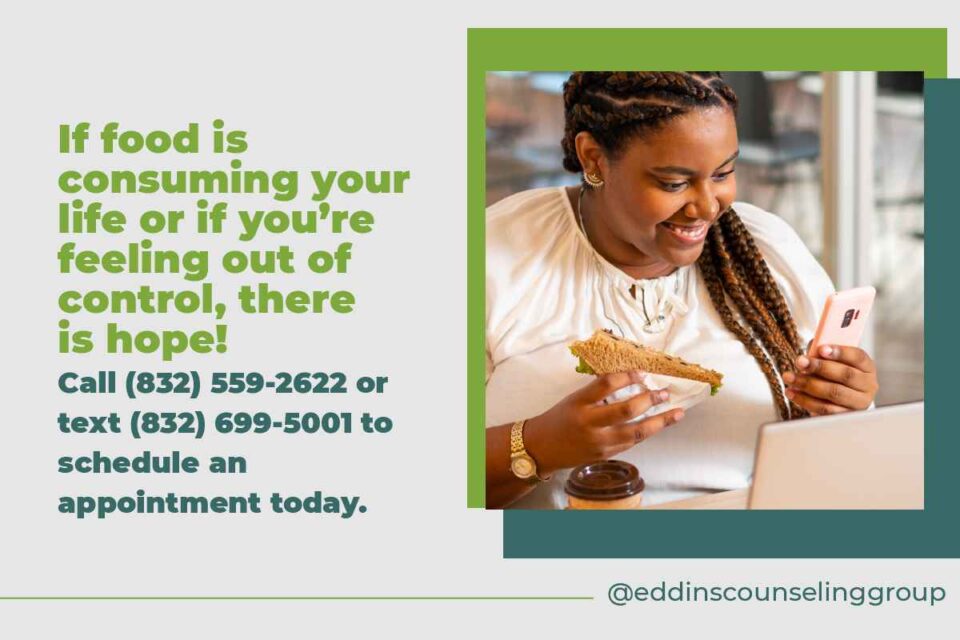
Next Steps
If food is consuming your life or if you’re feeling out of control, there is hope! An eating disorder therapist can help you find peace.
Give us a call at 832-559-2622 to find out more about Eating Disorder Treatment or get started now to schedule an appointment with our Eating Disorder Treatment counselors today.
Other resources to consider:
- How to Overcome Binge Eating: Start with These Strategies
- Webinar: Practicing Intuitive Eating in Your Daily Life
- How Therapy Can Help You Recover From Compulsive Overeating
- Ways to Support a Loved One with an Eating Disorder
- How to Stop Emotional Eating: 10+ Ways to Make Peace with Food
- Signs of Bulimia: Understanding and Treating the Disorder













